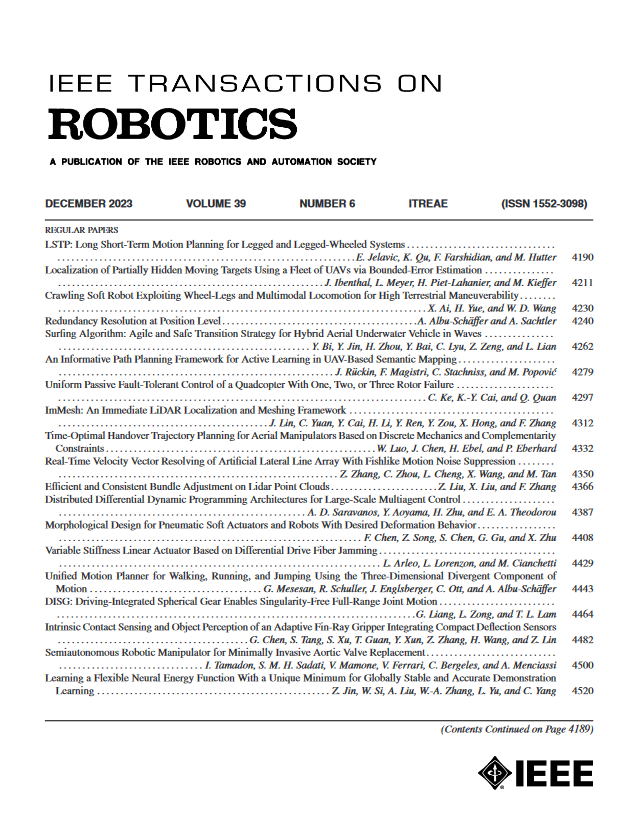CoverLib: Classifiers-Equipped Experience Library by Iterative Problem Distribution Coverage Maximization for Domain-Tuned Motion Planning
IF 9.4
1区 计算机科学
Q1 ROBOTICS
引用次数: 0
Abstract
Library-based methods are known to be very effective for fast motion planning by adapting an experience retrieved from a precomputed library. This article presents CoverLib, a principled approach for constructing and utilizing such a library. CoverLib iteratively adds an experience-classifier-pair to the library, where each classifier corresponds to an adaptable region of the experience within the problem space. This iterative process is an active procedure, as it selects the next experience based on its ability to effectively cover the uncovered region. During the query phase, these classifiers are utilized to select an experience that is expected to be adaptable for a given problem. Experimental results demonstrate that CoverLib effectively mitigates the tradeoff between plannability and speed observed in global (e.g., sampling-based) and local (e.g., optimization-based) methods. As a result, it achieves both fast planning and high success rates over the problem domain. Moreover, due to its adaptation-algorithm-agnostic nature, CoverLib seamlessly integrates with various adaptation methods, including nonlinear programming-based and sampling-based algorithms.CoverLib:基于迭代问题分布覆盖最大化的分类器装备经验库,用于域调谐运动规划
基于库的方法被认为是非常有效的快速运动规划,通过适应从预计算库检索的经验。本文介绍了CoverLib,它是构造和利用此类库的一种有原则的方法。CoverLib迭代地向库中添加一个经验-分类器对,其中每个分类器对应于问题空间中经验的可适应区域。这个迭代过程是一个活跃的过程,因为它根据有效覆盖未覆盖区域的能力来选择下一个经验。在查询阶段,使用这些分类器来选择预期适用于给定问题的体验。实验结果表明,CoverLib有效地缓解了在全局(例如,基于采样的)和局部(例如,基于优化的)方法中观察到的可计划性和速度之间的权衡。因此,它在问题域上实现了快速规划和高成功率。此外,由于其自适应算法不可知的性质,CoverLib与各种自适应方法无缝集成,包括基于非线性规划和基于采样的算法。
本文章由计算机程序翻译,如有差异,请以英文原文为准。
求助全文
约1分钟内获得全文
求助全文
来源期刊

IEEE Transactions on Robotics
工程技术-机器人学
CiteScore
14.90
自引率
5.10%
发文量
259
审稿时长
6.0 months
期刊介绍:
The IEEE Transactions on Robotics (T-RO) is dedicated to publishing fundamental papers covering all facets of robotics, drawing on interdisciplinary approaches from computer science, control systems, electrical engineering, mathematics, mechanical engineering, and beyond. From industrial applications to service and personal assistants, surgical operations to space, underwater, and remote exploration, robots and intelligent machines play pivotal roles across various domains, including entertainment, safety, search and rescue, military applications, agriculture, and intelligent vehicles.
Special emphasis is placed on intelligent machines and systems designed for unstructured environments, where a significant portion of the environment remains unknown and beyond direct sensing or control.
 求助内容:
求助内容: 应助结果提醒方式:
应助结果提醒方式:


